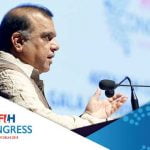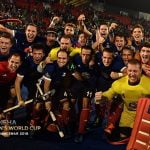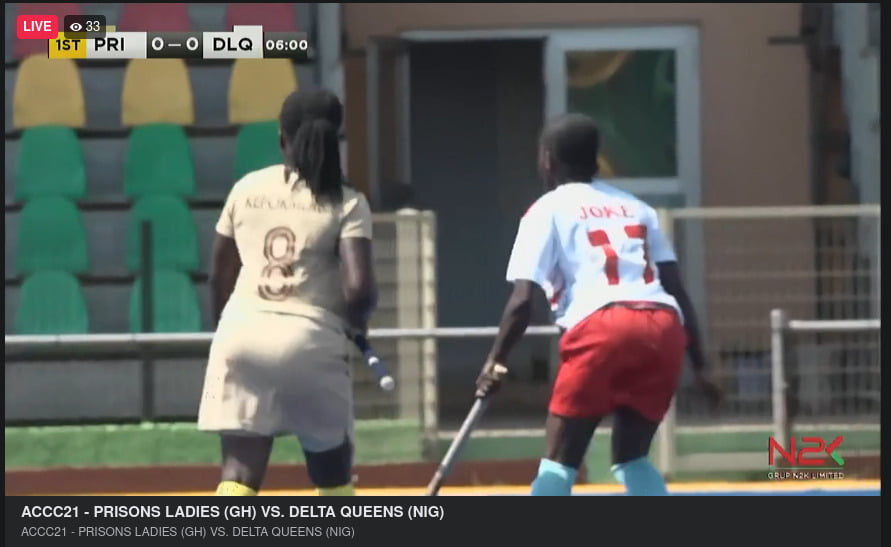21 December 2021
Lausanne, Switzerland: Will it won’t it? Will it won’t it? Whether sports events were going ahead or not during 2021 was the most common question among athletes, coaching staff, volunteers and fans. Despite the uncertainty that gripped the world, teams continued to prepare, volunteers continued to offer their services and fans continued to hope that they would get the chance to watch, support, cheer and celebrate.
And by a combination of determination, incredible attention to detail, superb organisation and a collective willingness, the greatest sports show on earth did get its day in the sun.
The Olympic Games Tokyo 2020 finally burst into life 12 months later than originally scheduled but with the same verve, energy and excellence of any previous Games. It was also a common observation that this Games was more emotional than any previous one, simply because everyone was so relieved that they could finally get to compete.
And it was glorious. Belgium men and Netherlands women came away with gold medals after displays of sheer excellence. The final between Australia and Belgium men will long be remembered as one of the most dramatic endings to a competition, while the Netherlands women swept to victory against Argentina at the end of a campaign that sealed their position as one of the best teams – in any sport – in the world.
It was not all about the winners. South Africa men dazzled us with their skill and creativity; India men and women’s teams showed how a nation’s support could be ignited by a performance; the host nation showed how an army of volunteers could make even an empty stadium a warm, welcoming and exciting place to be.
The other major international event to take place was the FIH Odisha Hockey Men’s Junior World Cup in Bhubaneswar. It was an event where new heroes stepped forth, not least the Player of the Tournament Timothee Clement of France and goal-scoring machine Miles Bukkens of the Netherlands. But it was the junior men of Argentina, led by former international and 2016 Olympic gold medallist Lucas Rey who stole the show. They out-played the hitherto excellent German team to win the title and become another chapter in Argentina’s hockey success story.
The third season of the FIH Hockey Pro League also got under way with some European teams able to get the competition started. Netherlands women continued where they finished season two – winning their matches against Belgium and Germany – and introducing a number of new players to their roster. Belgium men had mixed fortunes. They had a glorious opening encounter with Germany, winning both matches in dazzling style. They then met the rejuvenated Netherlands under new Head Coach Jerome Delmee. The Dutch won and gave a glimpse of an exciting new era for the men in orange.
The FIH Hockey Pro League continues in February with new teams taking their place in the competition – for this season only. Spain and India women’s national teams and Canada and South Africa men will be new names on the fixture list and the hockey world cannot fail to be excited to see these teams in action on a regular basis.
Looking ahead to the first part of 2022, the top quality action gets underway in Liège, Belgium, with the sixth edition of the FIH Indoor Hockey World Cup. The event is always a great spectacle and introduces new players and teams to hockey fans. Among the teams appearing in Liège will be Kazakhstan, Namibia, Iran, Ukraine and the Czech Republic, each displaying their own style of hockey.
A launch event for the FIH Indoor Hockey World Cup Belgium 2022 took place in September, with FIH CEO Thierry Weil, Wallonia Brussels Federation Sports Minister Valérie Glatigny, Liège Province Vice-President Katty Firquet, Wallonia Brussels Federation Sports Administration General Manager Alain Laitat and Royal Belgian Hockey Association President Patrick Keusters all in attendance. The event runs from 2 February to 6 February.
Despite some international hockey action taking place, much has also been disrupted or cancelled due to the global pandemic. The Junior Women’s World Cup in South Africa was a casualty, although FIH has confirmed that everything will be done so that the event takes place in 2022. Australia and New Zealand have seen all their international involvement curtailed due to Covid-related travel restrictions.
These restrictions have not stopped online hockey activity; the use of which has sped up and proliferated during the pandemic.
The #HockeyInvites Year of the Youth initiative, created and organised by the FIH Academy, saw numerous projects launched, with the aim of inspiring the next generation of athletes, coaches, officials and leaders. Among the projects launched were FIH World Hockey Camps, the FIH Academy Young Leader Membership and a #HockeyInvites Year of the Youth programme where young, aspiring hockey players from around the world were able to link up with athletes and coaches to remain engaged with the game and to develop their understanding and performance.
Meanwhile, also utilising online facilities to bring people together to share ideas was the programme of FIH Gender Equality Workshops. An opening webinar introducing the theme and starting a conversation was held in the early part of 2021 and from that launch point, webinars have been held by the Pan American Hockey Federation (PAHF), the African Hockey Federation (AfHF) and the European Hockey Federation (EHF). Each webinar unearthed different gender issues and set in motion plans to make important, progressive changes.
2021 was the year when the spotlight was thrown on every organisation’s environmental impact and sustainability strategies. The creation of the FIH Sustainability Task Force in March is an important step for hockey in this regard. Working with its partner Polytan and its Preferred Suppliers, the FIH will endeavour to ensure its environmental footprint is as small as possible. The delivery of climate positive turfs for Tokyo 2020 was one example of the progressive work being carried out in this area.
One of the pillars of FIH strategy is to extend participation at all levels. The exponential growth and recognition of Hockey ID is one facet of this strategy. With Hockey ID groups being formed in countries such as Chile, Papua New Guinea, Zambia the sport is reaching more and more people. The global award for the work of Silvina Forrester in Argentina moved Hockey ID to centre stage, while a coaching and participation camp organised by Hockey Ireland demonstrates the huge appeal of the sport.
Finally, while the stars of the game shine on the pitch, it takes a team behind the team to make sure that fans are kept in touch with all that is happening. This year sees the one year anniversary of the Watch.Hockey app, which has brought global hockey – matches, interviews, highlights – to hundreds of thousands of fans. At a time when we are restricted with what we can watch live, to be able to tap into hockey matches anywhere in the world is a huge boost for the sport.
And taking that coverage one step further, this year FIH launched a series of podcasts and hockey shows. The Daily Tokyo Hokke Show started the ball rolling, when a stellar list of stars joined together for a daily catch up on the Olympic action. This was followed by FIH Hockey Pro League shows and the Junior World Cup show. In a world where short snappy news items are the main form of hockey talk, the shows offer thoughtful, long-form analysis from experts within the game.
There is no doubt that 2021 has been a strange, disconcerting time for all, but the hockey community across the world has worked hard to ensure that, when the opportunity arises, hockey offers everyone some moments of drama, excitement, thoughtfulness and entertainment.
The full story, with pictures, is available here.
For more information about FIH and hockey in general, please download the Watch.Hockey app or follow the FIH social media channels – Facebook, Instagram and Twitter – and website.
#HockeyInvites







